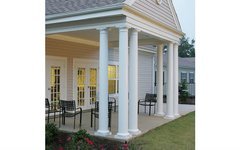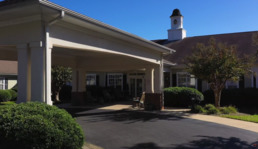Easley is a small city located in the western part of South Carolina, about 12 miles from Greenville. Slightly over 22,000 people live in Easley of whom 20% are aged 65 or older. Seniors looking for a financially friendly city should consider Easley. Its cost of living is 10 points below the national average. It scores 7.5/10 on the Best Places Comfort Index, which makes it one of the most pleasant places to live in South Carolina. It receives an additional 15 inches of rain, significantly less snow and an additional two weeks of sunshine as compared to national averages. Seniors will also find one-of-a-kind shops, parks and other entertainment venues in Easley
The average cost of assisted living in Easley, according to the Genworth Cost of Care Survey 2020, is $2,800 a month, which is significantly cheaper than the national average of $4,300. These costs may fluctuate based on the facility and the services offered.
Hundreds of thousands of American seniors utilize assisted living, a figure that is only growing. For these seniors, assisted living combines residential housing,assistance in daily activities, and some healthcare. These communities also strive to provide an atmosphere that is comfortable and engaging for their residents… Read More >
With an average monthly cost of $2,800, Easley is $1,188 less expensive than the state average of $3,988 and $1,500 less expensive than the national average of $4,300. Georgia at $3,500 a month, Florida at $3,700 a month and North Carolina at $3,800 a month have lower assisted living costs than South Carolina. Tennessee is the only state regionally to have a higher monthly cost, at $4,039.
Sumter, which averages $2,200 a month, is $600 less than Easley. Charleston, however, is $800 a month more expensive. Columbia, the state capital, averages $4,299 a month, slightly under $1,500 a month more expensive than Easley. Hilton Head, the well-known vacation spot, averages $5,475 a month for assisted living, or almost double the cost of Easley.
Note: Data for Easley was unavailable, so data for the nearest city, Greenville, was used instead.
The South Carolina Department of Health and Human Services offers financial assistance to low-income seniors residing in an assisted living facility under the Optional State Supplement program (OSS). Seniors can use these funds to help pay for the cost of room and board and meals. The OSS includes a small monthly stipend to purchase personal items.
To learn more about this and other available programs, visit our Assisted Living in South Carolina page.
| Contact | Description | |
| GetCareSC | (803) 734-9900 | A hub for resources for seniors in South Carolina, GetCareSC provides information regarding assisted living, transportation, meals and financial assistance. Seniors or their caregivers looking for an appropriate assisted living facility can check out GetCareSC’s directory of assisted living facilities in the state. |
| Appalachian Council of Governments | (864) 242-9733 | The Council is the local branch of the Area Agency on Aging. It offers information and assistance to seniors and caregivers. It sponsors the Long-Term Care Ombudsman Program and the Regional Family Caregivers Program. The agency is also responsible for linking seniors and caregivers with appropriate services for their needs. |
| South Carolina Department of Veterans’ Affairs | (803) 734-0200 | The Department’s mission is to help veterans with employment and housing issues, assist them if they need mental health care, enable them and their dependents to access the benefits to which they are entitled and connect them with long-term health care. The department runs three veterans’ homes in the state where older veterans can find assisted living, memory care or skilled nursing care. Although the veteran must pay for these facilities, financial assistance is available. |
| South Carolina State Health Insurance Program (SHIP) | (800) 868-9095 | The South Carolina State Health Insurance Program (SHIP) offers seniors in the state free, unbiased assistance to help them understand health insurance. This includes guidance on Medicare. Counselors can also answer questions about billing issues and how to find financial assistance to help pay for the cost of prescription drugs. Seniors or their caregivers can arrange a one-on-one session either in person or over the phone. |
| Long-Term Care Ombudsman Program | (864) 242-9733 | When a long-term care ombudsman receives a complaint about a facility from a senior, their caregiver or a member of the community, they try to resolve the problem. If the complaint is valid, the ombudsman will work with the facility to correct the issue. If the complaint is not valid, the ombudsman will explain his or her findings to the senior. Ombudsmen can also assist seniors with issues such as Medicare fraud. |
Facilities are licensed by the Bureau of Health Facility Licensing, which falls under the Board of Health and Environmental Control. To obtain a license and retain it, a facility must follow the regulations set forth by the Bureau. To learn more about this and specific regulations, visit our Assisted Living in South Carolina page.













